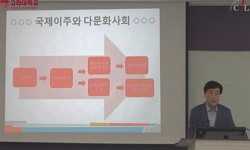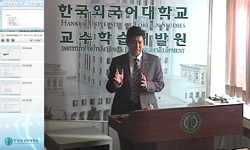한국사회에서 ‘다문화주의’라는 용어는 동아시아와 동남아시아 국가 출신의 여성과 남성들의 이주가 급속하게 증가하기 시작한 1990년대에 소개되었다. 다문화주의라는 개념은 문화적인 ...
http://chineseinput.net/에서 pinyin(병음)방식으로 중국어를 변환할 수 있습니다.
변환된 중국어를 복사하여 사용하시면 됩니다.
- 中文 을 입력하시려면 zhongwen을 입력하시고 space를누르시면됩니다.
- 北京 을 입력하시려면 beijing을 입력하시고 space를 누르시면 됩니다.
한국사회에서의 결혼 이주현상과 문화적 다양성의 문제에 관하여: 가부장제와 ‘다문화주의’의 행복한 결혼일까? = On Marriage Migration and Cultural Diversity in South Korea: Happy Marriage between Patriarchy and ‘Multiculturalism’?
한글로보기https://www.riss.kr/link?id=A105066211
- 저자
- 발행기관
- 학술지명
- 권호사항
-
발행연도
2017
-
작성언어
Korean
- 주제어
-
자료형태
학술저널
-
수록면
101-122(22쪽)
- 제공처
-
0
상세조회 -
0
다운로드
부가정보
국문 초록 (Abstract)
‘다문화주의’라는 용어는 이러한 국제결혼 이주가 전례 없이 빠른 속도로 증가하면서 한국사회에 널리 퍼지게 되었다. ‘결혼이주여성’들은 흔히 한국남편의 가족구성원들을 보살피는 돌봄 노동자로, 그리고 동시에 저출산이라는 심각한 사회문제를 해결하는데 도움을 줄 수 있는 (특히 남아를 임신할 것이 기대되는) 잠재적인 임신부로 여겨지곤 한다. 본 연구는 한국사회에서 국제결혼이 어떻게 정치화되어 왔고, 그리고 어떻게 가부장제적이면서 동시에 자본주의적인 사회구조가 월경(border crossing)의 맥락을 제공해 왔는지를 탐색해본다. 그 월경의 맥락 속에서 다양한 행위 주체들은 각자 점하고 있는 사회적인 위치를 바탕으로 하여 서로 경쟁하고, 타협하며 자신들의 위치에 대해 재해석을 하면서 살아간다. 본 연구에서는 개개 행위주체들의 상이한 관점들, 삶의 공간들, 그리고 그들이 점하고 있는 사회적인 위치들에 관하여 논의가 진행될 것이다. 또한, 그들은 어떻게 각자 점하고 있는 사회적 위치들을 조작하려고 시도하는지도 살펴볼 것이다.
한국사회에서 ‘다문화주의’라는 용어는 동아시아와 동남아시아 국가 출신의 여성과 남성들의 이주가 급속하게 증가하기 시작한 1990년대에 소개되었다. 다문화주의라는 개념은 문화적인 다양성을 가정하고 있고, 민족과 국가 간의 경계를 넘나드는 사람들, 생각들, 물건들 그리고 자본들 간의 상호연결성을 염두에 둔 개념이다. 하지만, 한국사회에서는 정부가 정책수행을 하기 위한 도구로 그 개념을 이용해왔다. 한국정부의 이민정책은 극도로 성이데올로기화(gendered) 되어왔고, 따라서 이민정책은 여러가지 유형의 국제이주가 발생하고 있음에도 불구하고 다른 아시아 국가출신의 여성들이 결혼을 통해서 한국으로 이주해 오는 현상에 주로 주목해왔다.
‘다문화주의’라는 용어는 이러한 국제결혼 이주가 전례 없이 빠른 속도로 증가하면서 한국사회에 널리 퍼지게 되었다. ‘결혼이주여성’들은 흔히 한국남편의 가족구성원들을 보살피는 돌봄 노동자로, 그리고 동시에 저출산이라는 심각한 사회문제를 해결하는데 도움을 줄 수 있는 (특히 남아를 임신할 것이 기대되는) 잠재적인 임신부로 여겨지곤 한다. 본 연구는 한국사회에서 국제결혼이 어떻게 정치화되어 왔고, 그리고 어떻게 가부장제적이면서 동시에 자본주의적인 사회구조가 월경(border crossing)의 맥락을 제공해 왔는지를 탐색해본다. 그 월경의 맥락 속에서 다양한 행위 주체들은 각자 점하고 있는 사회적인 위치를 바탕으로 하여 서로 경쟁하고, 타협하며 자신들의 위치에 대해 재해석을 하면서 살아간다. 본 연구에서는 개개 행위주체들의 상이한 관점들, 삶의 공간들, 그리고 그들이 점하고 있는 사회적인 위치들에 관하여 논의가 진행될 것이다. 또한, 그들은 어떻게 각자 점하고 있는 사회적 위치들을 조작하려고 시도하는지도 살펴볼 것이다.
다국어 초록 (Multilingual Abstract)
The term of ‘multiculturalism’ was introduced to South Korea in 1990s, as the immigration of women and men from East and Southeast Asian countries began to increase rapidly. Although the concept assumes cultural diversity and interconnectedness of...
The term of ‘multiculturalism’ was introduced to South Korea in 1990s, as the immigration of women and men from East and Southeast Asian countries began to increase rapidly. Although the concept assumes cultural diversity and interconnectedness of people, ideas, objects, and capital across the borders of nation-states, it became a tool for policy implementation by the government. Highly gendered migration policy has been limited to international marriage immigration of women from other Asian countries. The term of ‘multicultural family’ has gained currency in the South Korean society as it has increased at an unprecedented rate. Immigrant women are often viewed as caretakers for Korean husbands’ family members and potential bearers of the son for the family line, helping solve the serious problem of low birth rate of the country. This study explores how international marriage has been politicized in South Korea, and how patriarchal, capitalistic social structure has provided a context of border crossing where various agencies compete, negotiate and reinterpret their social positioning. The concept of multiculturalism will be re-visited by discussing different perspectives, spaces and positions which each agency occupies and manipulates.
동일학술지(권/호) 다른 논문
-
사회갈등수준 완화에 대한 혼합형 선거제도의 영향력: 혼합형 다수제와 혼합형 비례제 비교분석
- 전남대학교 사회과학연구소
- 김기동 ( Gi Dong Kim )
- 2017
-
- 전남대학교 사회과학연구소
- 이재묵 ( Lee Jae Mook )
- 2017
-
15분간의 이완이 직무스트레스로부터의 회복에 미치는 영향: 현장실험
- 전남대학교 사회과학연구소
- 박형인 ( Hyung In Park )
- 2017
-
- 전남대학교 사회과학연구소
- 박재원 ( Par Jaewon )
- 2017




 KISS
KISS






